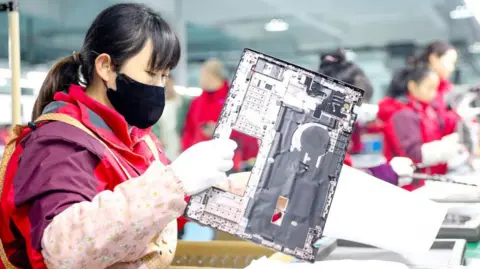Business reporter, BBC News
 Getty Images
Getty ImagesDeena Ghazarian had only been in business for a year when the trade policies of President Donald Trump’s first term of office sent her company into a tailspin.
It was 2019 and her California-based firm, Austere, had just agreed to supply several big US retailers with its high-end audio and video accessories that are largely manufactured in China.
Then Trump imposed sweeping tariffs on China, and overnight Deena found herself paying a 25% surcharge on every cable and component she imported – up from zero previously.
She was forced to absorb the costs and for a while thought she would go bust.
“I literally thought I am going to start and end a business in less than a year,” she says. “I had spent all this time, money and effort, and to have something like this blindside you was shocking.”
The firm pulled through, but like numerous other US businesses it now finds itself in a strikingly similar situation.
Since returning to office in January, Mr Trump has raised tariffs on all goods imported from China by 20%, and put taxes of 25% on Canadian and Mexican products, only to delay some of them until April.
 Deena Ghazarian
Deena GhazarianThe president says he wants to force these countries to do more to stop flows of illegal drugs and migrants into America, to bring more manufacturing back to the US, and to address what he sees as unfair trade imbalances.
But the duties are much broader in scope than last time, when they were phased in gradually and many products were granted exemptions.
Goods like smartphones, desktop computers and tablets are now incurring tariffs for the first time, while taxes on others have climbed higher.
“US importers have to pay these taxes not the exporters,” says Ed Brzytwa, vice president of international trade at the Consumer Technology Association (CTA), a North American trade body that represents more than 1,200 tech firms.
“It’s American businesses and consumers who will suffer.”
Businesses like Ms Ghazarian’s are particularly exposed. China is still the number one supplier of electronic products to the US, with imports totalling $146bn (£112bn) in 2023, according to official data.
Meanwhile, 87% of US video game console imports came from China that year, 78% of smartphones, 79% of laptops and tablets, and two-thirds of monitors, says the CTA.
While many American companies like Austere have diversified their supply chains away from China since Mr Trump’s first term, countries such as Thailand, Taiwan and Vietnam still do not offer the same manufacturing capabilities and expertise.
At the same time, the US president is now targeting Mexico – another major electronics supplier. And while domestic manufacturing in the US has increased, partly due to tariffs, it is still limited by higher costs and stricter regulations.
“Yes, Apple now makes some iPhones in India and [the Taiwanese chipmaker] TSMC has been diversifying to Arizona,” says Mary Lovely, a senior fellow at the Peterson Institute in Washington DC.
“But China is still a massive part of the supply chain. Relationships with new suppliers take time to develop, they are costly to develop.”
Research suggests that companies pass on a large proportion of the costs of tariffs by putting up prices. Earlier this month Corie Barry, boss of US electronics retailer Best Buy, said that the “the vast majority” of the new tariffs will “probably be passed on to the consumer” because vendors in the industry have such small margins.
In February, Taiwanese firm Acer said the price of its laptops would likely rise by 10% based on the 10% duties in place on China at the time, while US group HP has warned its profits would be lower because of the tariffs.
 Getty Images
Getty ImagesMs Ghazarian says she may have to raise her prices this year, but worries it could backfire. “There is a price point where the customer is satisfied with the value of goods provided.
“The moment I shift above that I start to lose customers. High inflation has squeezed Americans.”
During Mr Trump’s first term, companies such as Apple successfully secured exemptions for products, and we may yet see carve-outs.
Insiders have also suggested Mr Trump views tariffs as a negotiating tactic and could ease them if he wins concessions, as he did when China agreed to buy more American goods in a deal reached in 2020.
Fears of a US economic slowdown could also make him change course.
For the time being, though, tensions look likely to escalate. China, Mexico and Canada have vowed to retaliate against any US duties imposed on them, and this week Mr Trump threatened to double tariffs on Canadian steel and aluminium only to row back at the last minute.
He plans to impose “reciprocal tariffs” on the rest of the world soon, and threatened tariff increases of up to 60% on Chinese goods while on the campaign trail.
There is a risk this could drive up the price of tech goods around the world if China is forced to relocate manufacturing to countries where labour costs are higher. Moreover, countries may hit back with tariffs on imported US technology.
Ms Ghazarian says she is worried but at least she’s prepared this time. Like many other US business-owners she bulk-ordered extra inventory before Mr Trump took office, and is storing it in her east coast warehouse.
She hopes that will get the company through the next year until it can “pivot” again.
“That might mean finding a more cost-effective way to produce the product or doing something completely different. It’s frustrating I have to focus on survival rather than growing my business.”



